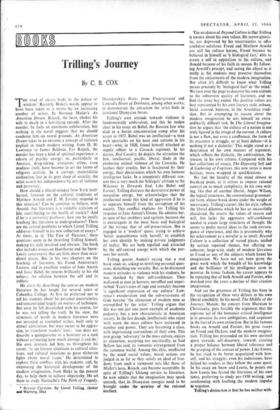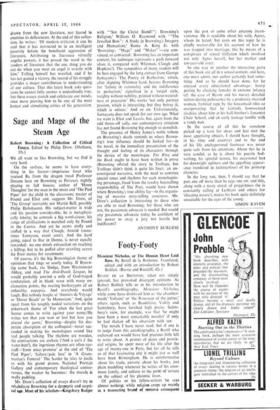D C IT
Trilling's Journey
By C. B. COX
'Mile road of excess leads to the palace of I wisdom.' Recently Blake's words appear to have been taken as a motto by an increasing number of artists. In Norman Mailer's An American Dream, Rojack, the hero, chokes his wife to death in a horrifying episode. After the murder, he feels an enormous exhilaration, but nothing in the novel stiggests that we should condemn him on moral grounds. An American Dream takes to an extreme a concept of violence implicit in much modern writing, from D. H. Lawrence to James Baldwin. For Rojack, the murder has been a kind of spiritual experience, a release of psychic energy; so, particularly in America. drug-taking, eroticism, crime, even madness itself, have become in art the forms of religious activity. In a corrupt, materialistic civilisation, lost in its grey sleep of security, the artist asserts his independence by acts of violence and perversity.
How should a liberal-minded New York intel- lectual, fostered on the cultural traditions of Matthew Arnold and E. M. Forster, respond to this situation? Can he continue to believe, with Arnold, that literature is a valuable criticism of life, contributing to the health of society? And if he is a university professor, how can he justify teaching this literature to undergraduates? These are the central problems to which Lionel Trilling addresses himself in his new collection of essays.* At times, as in 'The Fate of Pleasure,' these questions seem to be throttling Trilling himself, making his style involved and obscure. The book also includes essays on Hawthorne and the Snow- Leavis controversy that are little more than occa- sional pieces. But in his two chapters on the teaching of literature, his Freud Anniversary Lecture, and in excellent studies of Jane Austen and Isaac Babel, he returns brilliantly to his old subject. the relation between the self and its culture.
He starts by describing the course on modern literature he has taught for several years at Columbia College. At first he preferred not to tell his students about his personal uncertainties, and concentrated largely on matters of technique. But soon he felt dissatisfied with his course, for he was not telling the truth. In his view, the structures of words in modern literature were not intended as triumphal arches, built only to attract admiration, but were meant to be aggres- sive, to transform readers' lives: 'one does not describe a quinquereme or a howitzer or a tank without estimating how much damage it cad do.' His own interests led him, as throughout his career, 'to see literary situations as cultural situa- tions, and cultural situations as great elaborate fights about moral issues.' He determined to explore these conflicts with his students, and, by examining the historical development of the modern imagination, from Blake to the present day, to help them to achieve objectivity. He set them to study Nietzsche's The Birth of Tragedy, • BEYOND CULTURE. By Lionel Trilling (Seeker anat Warburg, 35s.) Dostoievsky's Notes from Underground and Conrad's Heart of Darkness, among other works, to demonstrate the attraction the artist finds in irrational Dionysian forces.
Trilling's own attitude towards violence is fundamentally ambivalent, and this he makes clear in his essay on Babel, the Russian Jew who died in a Soviet concentration camp after his arrest in 1937. Babel was an intellectual—a man with spectacles on his nose and autumn in his heart—who, in 1920, found himself attached as supply officer to a Cossack regiment. In his stories, Red Cavalry, he depicts the attraction the Jew, intellectual, pacific, liberal, finds in the exuberant animal violence of the Cossacks. He loathes their cruelty, but is fascinated by their energy, their decisiveness which his own humane intelligence lacks. In a completely different con- text this is very much the Schlegels' attitude to the Wilcoxes in Howards End. Like Babel and Forster, Trilling distrusts the destructive power of masculine energy, but acknowledges that the intellectual needs this kind of aggression if he is to separate himself from the corruption of his society. This conflict explains for Trilling his response to Jane Austen's Emma. He admires her, in spite of her snobbery and egotism, because she is extravagant in the most basic and biological of the virtues, that of self-preservation. She is engaged in a 'modern' quest, trying to achieve 'better acquaintance with herself,' to establish her own identity by making private judgments of reality. We are both repelled and attracted by the self-centred energy with which she pur- sues her search.
Trilling quotes Auden's saying that a real book reads us, asking us terrifying personal ques- tions, disturbing our security. But, as he discussed modern attitudes to violence with his students, he was shocked by their self-confidence. They wallowed at ease in horrors, unruffled and unper- turbed. Yeats's cries of rage and sexuality became 'a significant expression of our culture.' Law- rence's exasperation and the subversiveness of Gide became 'the alienation of modern man as exemplified by the artist.' Trilling argues that this was not just one more example of academic pedantry, but a new characteristic in American society. In the last decade, intellectuals who reject with scorn the mass culture have increased in number and power. They are becoming a class, with imprisoning conventions of their own. This new group, 'adversary' to the mass culture, enjoys its alienation, accepting too uncritically, as Saul Bellow has said, its romantic estrangement from the common world. Among this Elite, unaffected by the usual social values, moral actions are judged in so far as they satisfy an ideal of free- dom; from such a viewpoint acts like those of Mailer's hero, Rojack, can become acceptable. In spite of Trilling's lifelong service to literature, he now admits that the imagination may speak Untruth, that its Dionysian energies need to be brought under the scrutiny of the rational intellect. The weakness of Beyond Culture is that Trilling is unsure about his own values. He seems quietis- tic, too depressed by his uncertainties to offer confident solutions. Freud and Matthew Arnold are still his culture heroes, Freud because he believed in himself as 'a biological fact,' able to create a self in opposition to his culture, and Arnold because of his faith in reason. By follow- ing Arnold's precept, and seeing the object as it really is, his students may preserve themselves from the enticements of the modern imagination. But often it's difficult to know what Trilling means precisely by 'biological fact' or 'the mind.' We turn over the page to discover his own attitude to the subversive quality of literature, and we find the essay has ended. His positive values are best represented by his own literary style, urbane, lucid, assured, humane, in the Arnoldian tradi- tion. But in attempting to reason about the modern imagination he sets himself an extra- ordinarily difficult task. In The Liberal Imagina- tion he argues that 'the culture of a nation is not truly figured in the image of the current. A culture is not a flow, nor even a confluence; the form of its existence is struggle, or at least debate—it is nothing if not a dialectic.' This might stand as a description of his own manner of argument, which reflects the dialectic, the ambivalence, the tension, in his own culture. Compared with his last collections of essays, The Opposing Self and A Gathering of Fugitives, this new series is more hesitant, more wrapped in qualifications.
We feel the lucidity of the mind almost at breaking point, as it strives to impose rational control on so much complexity. In his own writ- ing, like that of another liberal, Angus Wilson, the logical structures, the conventional grammati- cal form, almost break down under the weight of uncertainty. Trilling's career, like his style, reflects the liberal dilemma which he has so successfully elucidated. He asserts the values of reason and will, but lacks the aggressive self-confidence needed to create large structures of thought. He seems to prefer moral ideas to the rank extrava- gance of experience, and this is presumably why his achievement as a novelist is so small. Beyond Culture is a collection of varied pieces, unified by certain repeated themes, but offering no coherent, large-scale study of modern literature or Freud or any of the subjects which haunt his imagination. We have not yet been given the great work which the breadth of his knowledge and the brilliance of his intelligence seem to promise. In ironic fashion, his career appears to be repeating that of both Arnold and Forster, who watched over the years a decline of their creative imagination.
And yet the greatness of Trilling has been in his recognition of these very defects in his own liberal sensibility. In his novel, The Middle of the Journey, Maxim, the convert from Marxism to Christianity, puts forcibly the argument that the supreme act of the humanist critical intelligence is to perceive its own ambiguities, and acquiesce in the fact of its own extinction. But in his famous books on Arnold and Forster, his great essays on Freud and Dickens and the modern imagina- tion, Trilling has proceeded on his own spiritual quest towards self-discovery, towards creating a proper balance between liberal tolerance and the grasping of the sources of power. Like Emma, he has tried to be better acquainted with him- self, and his struggles, even his indecisions, have helped his readers as they follow the same quest. In his essay on Snow and Leavis, he points out how Leavis has feared the literature of his own times, preferring to study pre-1930 writing, and condemning with loathing the modern impulse to negation.
Trilling's distinction is that he has neither with- drawn from the new literature, nor feared to examine its deficiencies. At the end of this collec- tion, he writes: 'Of modern criticism it can be said that it has instructed us in an intelligent passivity before the beneficent aggression of literature. Attributing to literature virtually angelic powers, it has passed the word to the readers of literature that the one thing you do not do when you meet an angel is wrestle with him.' Trilling himself has wrestled, and if he has not gained a victory, the record of his struggle provides a major contribution to understanding of our culture. That this latest book asks ques- tions he cannot fully answer is undoubtedly true, but these essays stretch and exhilarate our minds, once more proving him to be one of the most honest and stimulating critics of his generation.



































 Previous page
Previous page